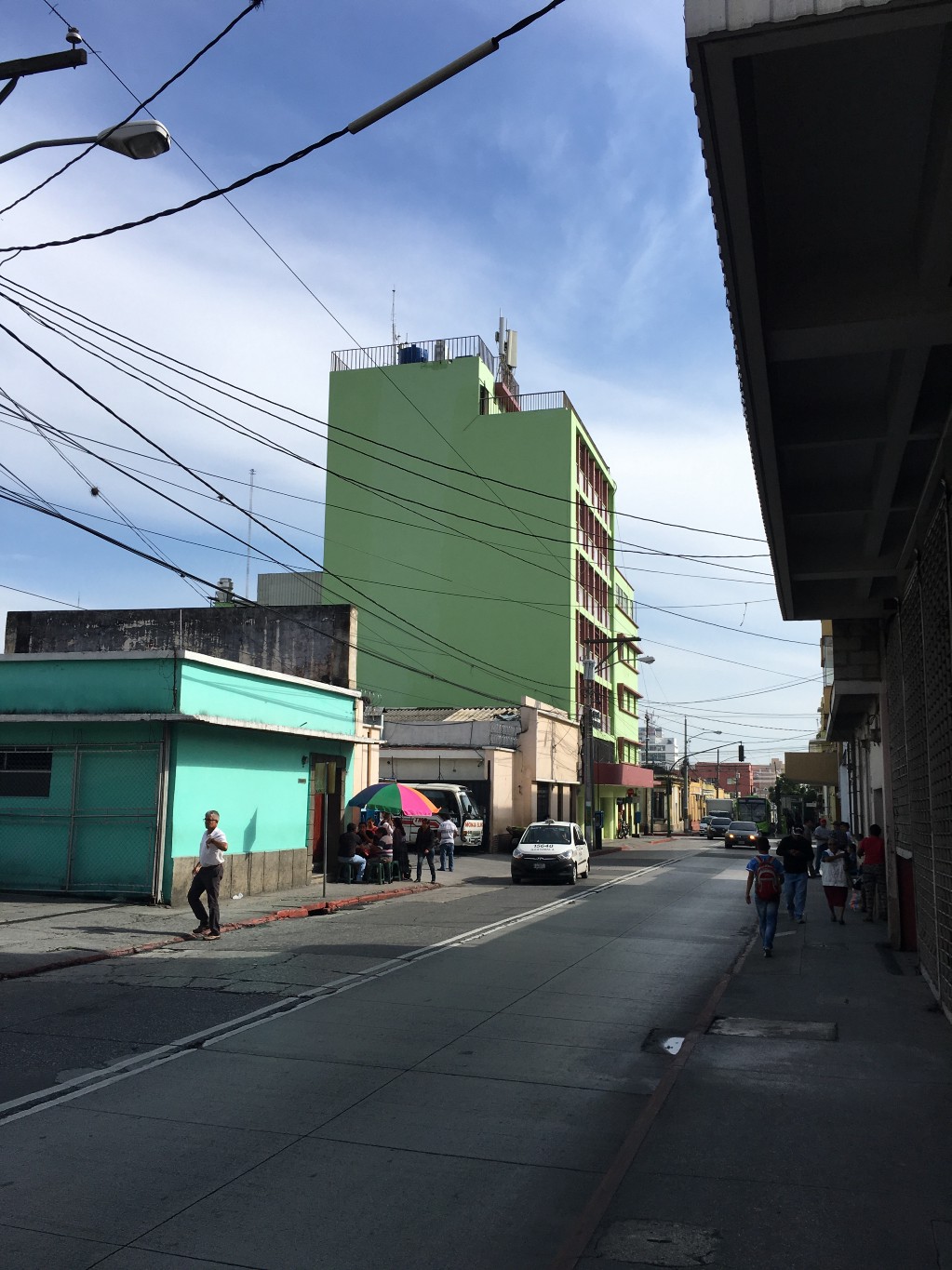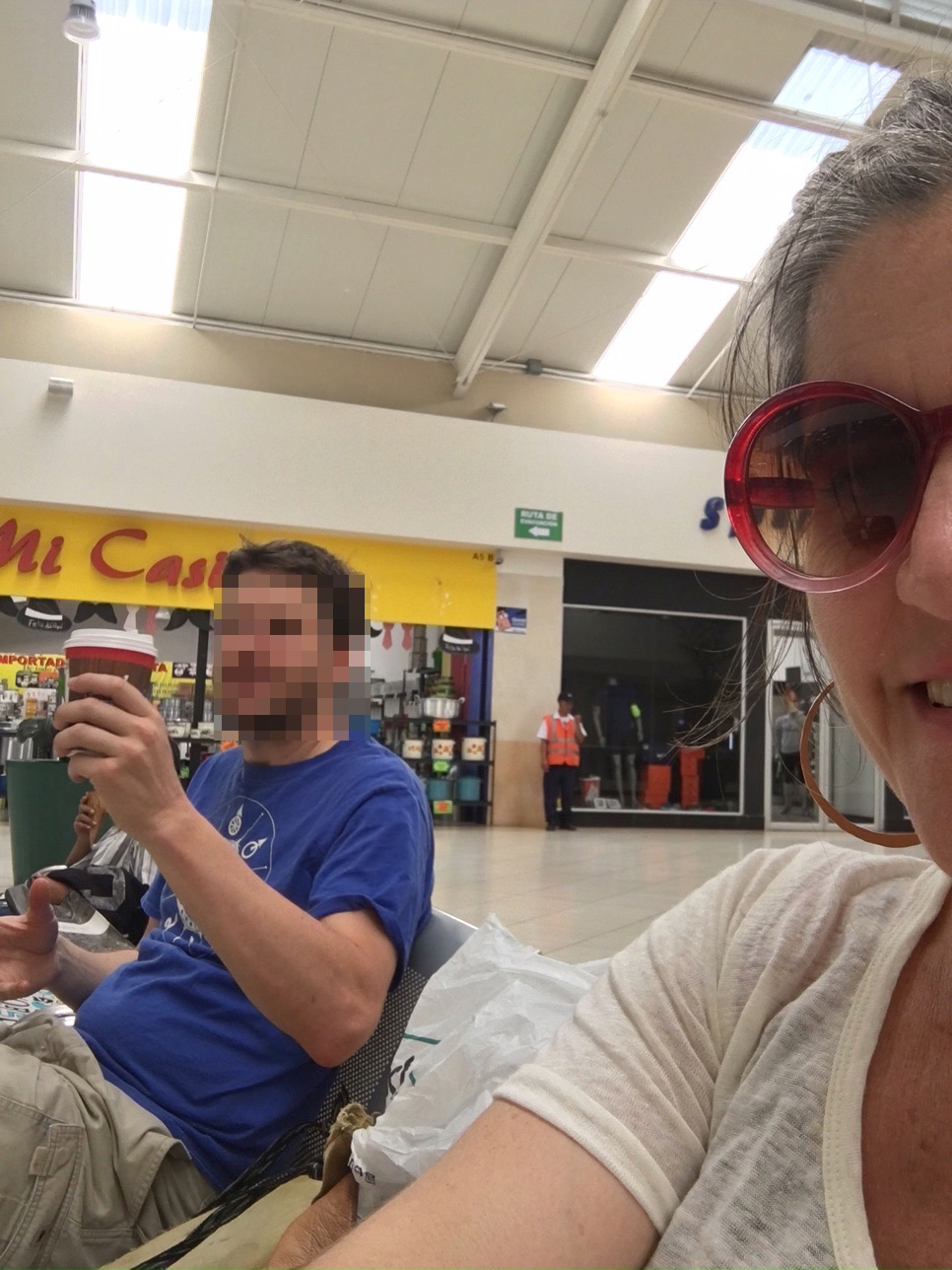The Fancy Bus
Guatemala Diaries, Part II

The airport in Guatemala City has very low ceilings and a lot of non-structurally relevant metal tubing. It does not have a bank machine, at least not one that we could see. I said I could exchange some dollars, but M. was worried about the rate. M. really likes to save money, whereas I prefer to throw money in a blender and watch it spin around. M.’s sister, Alexis, was waiting for us when we cleared immigration.
“I thought you were already in Flores,” M. said, and she explained that she and her boyfriend had flown all the way there and all the way back because it was too stormy to land.
“I didn’t even know you could fly there,” I said, giving M. a dark look. Our plan was to take a bus there the next day.
M. had forgotten to tell Alexis I was coming, and even though I know she likes me, she greeted me with an amount of enthusiasm and surprise more appropriate to running into someone at the Grass Valley Safeway. M. and his family members seem to have collectively skipped the briefing on Effusiveness Appropriate to Greetings and Farewells. I have been good friends with M. for four years now and he has never said anything to me like, “I’m so glad you came” or even “Hey, how are you?” I find this refreshing at times. Other times, like when I ask him a question and he simply doesn’t answer (His unofficial motto: “Just because BULLSHIT SOCIETY tells you you’re supposed to act a certain way doesn’t mean you have to!”) it can be frustrating.
Avianca Airlines was putting Alexis and her boyfriend up in a hotel nearby called El Conquistador.
“Maybe we can just sneak in with your group,” M. said, his eyes positively glittering with the thought of two employed adults saving $100 by way of a really stressful lie. Alexis groaned and looked at me imploringly.
“Oh my God, that is going to make me so uncomfortable,” she said.
“Ok,” M. said, bargaining. “Maybe we’ll just hitch a ride on the van to the hotel.” Alexis was still looking at me.
“Don’t worry,” I said. “If we decide to go there, we’ll just take our own taxi.” At this moment, right behind us, another Avianca passenger asked an Avianca employee about the hotel.
“The hotel is cuatro estrellas,” the Avianca lady said. M.’s eyes flew open.
“Cuatro estrellas!” he exclaimed. He doesn’t speak Spanish very well but over the course of our trip I was to discover that he caught on very quickly to expressions concerning non-thrift.
“I bet it’s like, 75 bucks,” I said. I might as well have said it was $75,000. We found a taxi. “Let’s just make sure we take the good bus to Flores tomorrow,” I said. “You’re lucky I’m not making you fly.”
“Come on, you don’t want to take a real authentic Guatemalan bus?”
“I crossed ‘Take shitty bus in Latin America’ off my bucket list many years ago,” I said, and turned my attention to the window. After eight hours of travel it was heaven to be in a taxi speeding down an empty rain-soaked Guatemala City boulevard. We passed a hulking windowless university, a statue of a general, obscure to history but undisputed top dog of his traffic circle, and blocks and blocks of two-story cement block stores. The occasional colonial-style building gussied up a corner as it also faded and died before our eyes. A few motorcycles passed us, and then a few more, and then we were alone.
I told M. I didn’t mind that we were about to stay in a hotel that wasn’t that nice as long as it wasn’t dirty and didn’t feel dangerous. “I am aware that some things that feel dangerous aren’t actually dangerous but in addition to things not being dangerous I also don’t want things to feel dangerous,” I said.
As we got closer to the city center we explained to the driver that we we were going to Flores on a bus in the morning and wanted a hotel in Zona 17, near the bus station. He explained to us that there were no hotels in Zona 17 and we said, “Fine, near-ish” and he said there were no hotels nearish either and we said “Ok just sort of close to there then,” but apparently that wasn’t a thing either. But there were lots of hotels in Zona 1. “If you’re going to Flores,” he said, “There’s a bus station in Zona 1 that also has buses to Flores.”
“Oh, great,” M. said. But I said, “Doesn’t the fancy bus leave from the Zona 17 bus station?”
“That’s what the guidebook said, but the guidebook is wrong a lot,” M. said. “And it would be cool if we just stayed in Zone 1 and the bus was right there.”
“But it’s not,” I said. “I don’t think they would get something like that wrong.”
“The guidebook is really wrong all the time,” M. said.
I agreed to stay in Zona 1 — because it seemed like we had to — but we had to go to get the bus in Zona 17 in the morning. “I will not be tricked into the bad bus,” I said.
“I’m not trying to trick you into anything,” M. said.
The taxi driver stopped in the middle of a dark, quiet block. “This is where the bus for Flores leaves from,” he said. “And there’s a hotel right across the street.” To our right was an empty walled-in parking lot. To our left was a building with a lot of bars on it and a neon sign that said “Hotel.” I also think I thought I saw hookers but my brain might have inserted them into the space. “Un poco mejor,” I said. “Just a little bit un poco mejor.”
We ended up in a depressing but totally acceptable cave of a room with pea-green dishtowely things for curtains in the tiny windows that looked out on walls and a showerhead sprouting weird white cords that I hoped were not electrical although are there even other kinds of cords. It was probably $20 less than the Conquistador where, in an alternate universe, I was already chugging a beer in the shower. But it was clean and the door locked. I bought a beer. The lady overcharged me. I didn’t care at all but M. talked about it for days. I took a shower. It was cold. I didn’t care. We slept.

In the morning, we found a bank machine and ate a meal of chicken thighs and tortillas that we would eat again for dinner. People were selling sunglasses and batteries and clothing and it seemed like it was a business district but just people business, not finance business.

“I’m so happy to be out of Nevada City right now that the streets could be lined with heads mounted on stakes and I’d be happy,” M. said. “Maybe we should just walk by that bus station and see what the deal is.”
I have spent many months of my life in Latin America and felt both weary and smug. It was very annoying to me that M. was not trusting me as an expert when I am practically from here. “Trust me,” I said. “There’s no way the nice bus leaves from that station.”
“Maybe we should just ask,” he repeated when we passed it.
The “station” was still empty. Two men, both workers in green shirts and baseball hats, swept dirt. I imagined grilling them like a dipshit, “Dónde está el FANCY BUS???”
“Look,” I said, “I think if the book says we should go to Zona 17, we should go to Zona 17. Also, I know you’re just hoping those guys will be like “Oh, yes, the bus leaves from Zona 1” and then you’ll try to convince me we should just take that bus because it’s right here and why should we take this long taxi ride from Zona 1 to Zona 17 when there’s just a bus right here. It says in the guide book that the good bus leaves from Zona 17 so, I mean, I am pretty sure the bus leaves from Zona 17.”
M. just nodded. “Dear Diary,” he said. “Today I learned a new Spanish word. Zona.”
In the end, we packed up and took a taxi to Zona 17, about forty minutes away down a long boulevard just like the one we were on the night before. In the distance were a few big houses, their roofs glinting through the foliage. I was encouraged by the relative proximity of wealth, because it meant we were getting closer to My Fancy Bus.
We pulled up in front of a building with a lot of buses out front — very encouraging. Some of them were the kind of bus I had in mind, gleaming things with primary color logos, rounded edges, thrillingly pod-like. Others were just normal, shoeboxy buses. We walked through a mall selling sandals, Hello Kitty wallets and Pikachu backpacks. We came to an information booth. I asked the woman where we would find the Linea Dorada bus company. She shook her head. “Linea Dorada doesn’t leave from here,” she said.
“We are going to Flores,” I said, thinking she had just misunderstood me.
She pointed at a dingy storefront. “That is the company goes to Flores.”
“El único?” I said with telenovelic horror.
She nodded. “El único. Linea Dorada salen de la Zona 1.”

Fourteen million people live in Guatemala, and between Guatemala City and Flores, our driver stopped to chat with most of them. We also stopped for the peanut guy, the water guy, the fruit guy, the gum and candy lady, and the empanada lady, a lady — the less said about this the better — who really knows how to insert herself into your day. The bus ride was supposed to be eight hours, but it was twelve.
Somewhere around hour seven I was digging in my previously nice leather tote for my phone and discovered that the bottom of my bag was wet. I thought it was water but in fact, it was urine. And no — I did not pee on my own bag. “Oh, well,” an optimist might say here. “At least you got to see Guatemala!” But that optimist would be wrong, because the windows of this bus — all of them — had been covered over — on purpose — with a sort of white film. I don’t know if that white film was for privacy, or to keep out the sun, but, as white films tend to be, it was not transparent. So I traversed the entire, picturesque country of Guatemala, for the first and last time, without seeing any of it.
For M., misery and authenticity are, in the context of travel, indistinguishable. He sat next to me reading “Ten Greek Plays,” smiling the Buddhist half-smile of a man who has gotten exactly what what he wants without even trying.
